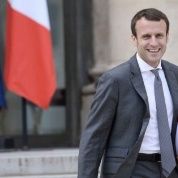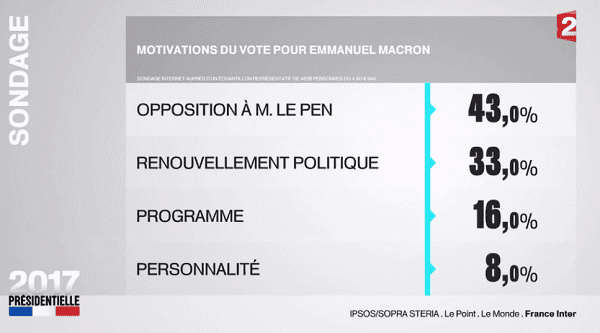On Sunday, neoliberal candidate Emmanuel Macron won a relatively easy victory against the far-right National Front, still infamous for the majority of French voters despite the rebranding operation engineered six years ago by its new leader, Marine Le Pen. With the indirect support of the mainstream media, her strategy still paid off, obtaining a total of 11 million votes — about 4 more million than in the first round — yet below the combined abstention-spoiled ballot.

ANALYSIS:
French Leftists Can't Stomach Voting for Macron, Despite Fascist Threat of Le Pen
Macron obtained just 42 percent of the popular vote — including a large part who rejected the far right rather than supporting him — only about 8 percentage points above the abstention rate.
Sunday's vote represents the lowest turnout rate in the history of France's fifth Republic. Unlike the 2002 runoff between former President Jacques Chirac and far-right leader Jean-Marie Le Pen (Chirac won with 82 percent of the vote and the turnout rate reached 80 percent), 15 years later, a large part of anti-fascists voters refused to support the "candidate of the establishment," considering that neoliberal policies have been paving the way for the surge of the far-right.
Moreover, Macron did not make much effort to gain their support. When campaigning for the runoff vote, he categorically refused to change one line of his program and explicitly warned that he will interpret all votes in his favor as a vote of support and not a strategic vote against Le Pen.


Despite Macron's constant efforts to stick to a very vague program during the campaign, his neoliberal agenda remains obvious. He was the mastermind behind most of Hollande's most contested policies, including a labor reform pushed by the business sector which unprecedentedly rolled back French workers' rights.
As Hollande popularity fell to become the least liked president in modern French history — and therefore the first who did not even seek re-election — Macron made huge efforts to appear as a complete outsider. He had to play a fine line between “neither ... either” to the point of sounding tautological and empty, resulting in ridicule on social media. He tried to quote one of France's most popular hip hop bands about social inequalities in a bid to appear close to the working class, but the former Rothschild executive could not even read the quote correctly.
His program includes cutting corporate tax from 33 to 25 percent. The 35-hour legal workweek would remain but negotiation of real work hours would be left to the company level. He set a target of 60 billion euros for cuts in public spending including 15 billion euros in public health spending. Macron also embraced France's current paranoia about security and public order, promising to increase prison capacity by 15,000, hiring 10,000 police, and raising defense budget to 2 percent of GDP, from just under 1.8 percent in 2016.
His campaign was partly funded by France's wealthiest, some of whom have relocated in Belgium to pay lower taxes — Macron met over 40 of them last October in Uccle, an upper-class district of Brussels, according to Belgian daily L'Echo.
But the opposition to Macron's neoliberal agenda has already started, with demonstrations called for tomorrow in Paris by France's main labor unions, while left-wing leaders like Melenchon have called for unity for the "third round" — the legislative elections on June 11 and 18.